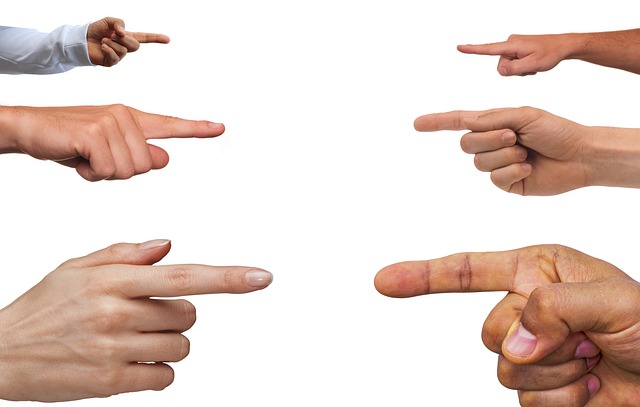What Is Behind the Need to Blame?
By Dr. Margaret PaulDecember 31, 2006
Do you find yourself automatically blaming yourself or others? Find out what is behind the need to blame and what you can do about it.
 Why do we blame ourselves and others? What is the payoff?
Why do we blame ourselves and others? What is the payoff?
Blaming Ourselves
I had a session with Frank who was very upset with himself for playing tennis so badly in his recent match. In fact, he was furious with himself. "I'm a much better player that that! How could I have played so badly! I'm just an adequate jerk!" He was screaming at himself in the car, and feeling worse and worse by the minute.
As we explored his anger and self-blame, Frank told me that his father, a very controlling man, was constantly angry with him for his mistakes.
"How did his anger affect you regarding making mistakes?" I asked.
"It made me nervous and I probably made more mistakes."
"Frank, open to learning with the angry and blaming wounded part of you and ask why he persists in getting angry and blaming toward your Child."
"This part of me believes that if I get upset enough, I won't keep doing things wrong."
"So this wounded part of you, the part that is very much like your father, believes you can have control over getting yourself to do it right. Has this worked?"
"No, not at all - just like with my father. And I know that, why do I keep doing it?"
"What about it do you like?"
"Well, I really like the feeling I get when I'm angry and blaming. In that moment, I feel powerful."
"So it sounds like you are addicted to the momentary feeling of power you get when you are angry. What do you think you would feel if you didn't get angry?"
"I guess I would feel helpless, and I hate feeling helpless."
"So the payoff is that, even though you know it doesn't work to control yourself from making mistakes, it does work to take away the feeling of helplessness, and this seems to make it worth it to you. You can't control the mistakes, but you can control the feeling of helplessness, so on that level, the control is working for you, is that right?"
"That's right! I am addicted to the feeling of power. I like that feeling."
"And, it gets you out of having to take responsibility for managing your feelings as a loving Adult. You'd rather feel the momentary sense of power and then the guilt at doing something wrong, than deal with the feeling of helplessness. So, until you are willing to feel the authentic feeling of helplessness and do the work of Inner Bonding to learn to show up as a loving Adult for this difficult feeling, you will keep getting angry at yourself. If you want to stop the self-blame, you would need to develop the loving Adult through the practice of Inner Bonding."
Blaming Others
Kim was struggling with her frequent anger and irritation at others. She didn't like the fact that she often got angry and blaming, but she couldn't seem to stop.
"Kim, what triggers your anger? What happens between you and another person that triggers your anger?"
"Well, I'm not sure. It seems to happen when someone criticizes me, but it also happens when someone withdraws from me. Sometimes it happens when someone tells me what to do."
"So what do you think you are feeling under the anger when someone criticizes you or withdraws from you?"
"I feel rejected."
"When someone is judgmental toward you or disconnects from you, do you think you might also feel lonely?"
"Lonely - yeah, that's the feeling. I feel so lonely when someone doesn't accept me or shuts me out. I think I also feel lonely when someone tells me what to do, because they are not seeing me or caring about what I want. They just want me to do what they want, and I hate being controlled. My mother was so controlling, just wanting what she wanted and not seeing me at all or caring about what I wanted."
"Loneliness is a very hard feeling to feel. So is helplessness over others' behavior. These feelings tap into the loneliness and helplessness of being an infant and knowing you will die if no one comes when you cry. Do you think it's possible that your anger and blame is covering over these difficult feelings of loneliness and helplessness?"
"Yes, I think so," responded Kim. "I think I want to get others to stop doing what they are doing so I don't have to feel lonely and helpless."
"Right. And aren't you trying to control them with your anger and blame, just as they are trying to control you with their criticism, withdrawal, and telling you what to do?"
"Yes, but if I didn't try to control them, what would I do?"
"Learn how to take full responsibility for your own feelings of loneliness and helplessness. This is part of what Inner Bonding is all about - learning how to show up as a loving Adult for these painful feelings, rather than act from your wounded self to protect yourself against them. When you can fully manage these difficult feelings through acknowledging them, embracing them with compassion, nurturing them with your spiritual Guidance, and then releasing them to Spirit or through other release techniques, you will find yourself no longer getting angry and blaming."
"How long will this take?" asked Kim.
"As long as it takes. Do you have something better to do that learn how to show up as a loving Adult?"
Kim laughed. "No. I guess it's time to start."
 Send this article to a friend
Send this article to a friend  Print this article
Print this article  Bookmarked 14 time(s)
Bookmarked 14 time(s)
| Related Articles |
|---|
| The Poison of Resentment |
| Controlling Behavior - How Do You Attempt to Control? |
| Birthday Cake |
Comments
| Author | Comment | Date |
|---|---|---|
| Join the Inner Bonding Community to add your comment to articles and see the comments of others... | ||

Daily Inspiration
If someone's behavior makes your stomach tight, attend. Your stomach may be reacting to an energy that is unloving. It is only when you attend to your inner feelings that you can take loving action in your own behalf.
By Dr. Margaret Paul

 Share with Del.icio.us
Share with Del.icio.us Share with Digg
Share with Digg






